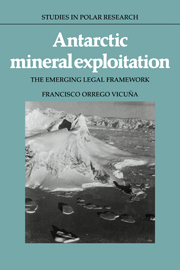Book contents
- Frontmatter
- Contents
- Preface
- Acknowledgement
- Abbreviations
- Part I The international legal framework of Antarctic co-operation and the development of resources
- Part II Alternative approaches to the conservation and development of Antarctic minerals: the process of internal accommodation
- 5 Basic elements of the regime for the exploration and exploitation of Antarctic mineral resources
- 6 Special policies pursued by the mineral resources regime
- 7 The distribution of powers within the regime: models and alternatives for accommodation
- 8 The institutional system of the mineral regime
- Part III Issues and options relating to the external accommodation
- Appendix 1 The Antarctic Treaty
- Appendix 2 Table of signatures and ratifications
- Table of Cases
- Table of Statutes and national legislation
- Table of Treaties
- Bibliography
- Index
7 - The distribution of powers within the regime: models and alternatives for accommodation
Published online by Cambridge University Press: 04 November 2009
- Frontmatter
- Contents
- Preface
- Acknowledgement
- Abbreviations
- Part I The international legal framework of Antarctic co-operation and the development of resources
- Part II Alternative approaches to the conservation and development of Antarctic minerals: the process of internal accommodation
- 5 Basic elements of the regime for the exploration and exploitation of Antarctic mineral resources
- 6 Special policies pursued by the mineral resources regime
- 7 The distribution of powers within the regime: models and alternatives for accommodation
- 8 The institutional system of the mineral regime
- Part III Issues and options relating to the external accommodation
- Appendix 1 The Antarctic Treaty
- Appendix 2 Table of signatures and ratifications
- Table of Cases
- Table of Statutes and national legislation
- Table of Treaties
- Bibliography
- Index
Summary
Basic interests and participation in the exercise of powers
Once there is no consensus as to who has jurisdiction over the mineral resources of Antarctica, the problem arises that it is not enough to identify the powers to be exercised in the context of the regime, it is also necessary to determine by whom they are to be exercised, and how. It is on this point that all the interests of basic importance involved in the issue must be satisfied, and these therefore are the key questions which the internal accommodation has to settle.
Writers are in agreement upon the main interest groups that must be taken into account in order to effect this accommodation, together with the inescapable realities linked to each interest and the corresponding legal positions, with particular reference to the problem of jurisdiction. A study by Keith Brennan calls attention to four basic interest groups in this regard. The first of these relates to those claiming sovereignty. In this connection Brennan observes: ‘That sovereignty is real. It remains real notwithstanding the fact that other states do not acknowledge that it is validly exercised; and it would be quite unrealistic to entertain the belief that sovereignty will be abandoned either in form or in substance’.
- Type
- Chapter
- Information
- Antarctic Mineral ExploitationThe Emerging Legal Framework, pp. 314 - 348Publisher: Cambridge University PressPrint publication year: 1988

